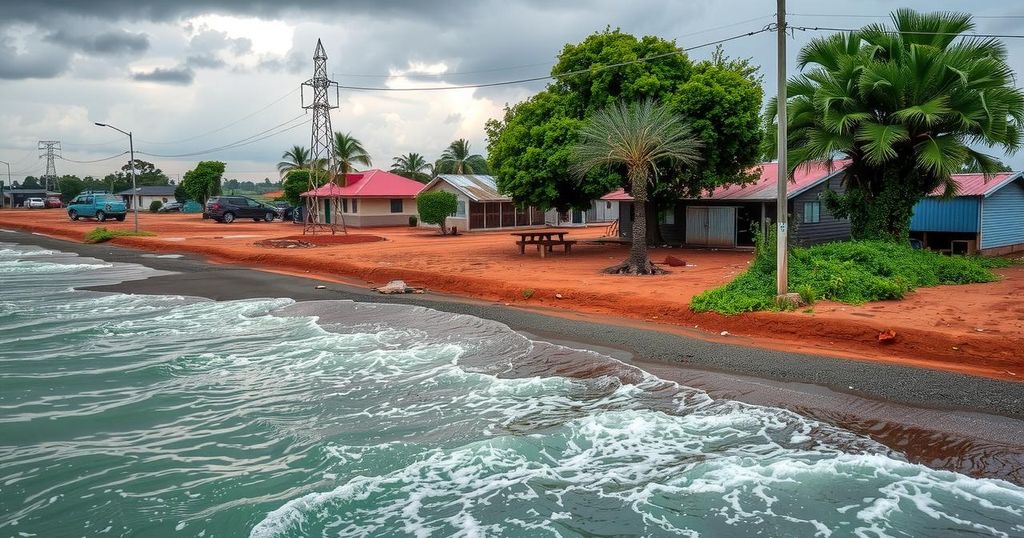World news
AFRICA, CHI, CHIDO, CLIMATE, CLIMATE CHANGE, CLIMATE CHANGE AND METEOROLOGICAL SERVICES, FRENCH INDIAN OCEAN, GLOBAL WARMING, GUY TAYLOR, INAM, LUCY MTILATILA, MALAWI, MOZAMBIQUE, NATIONAL INSTITUTE OF METEOROLOGY, NATURAL DISASTERS, PARIS AGREEMENT, PEMBA, UNICEF, ZIMBABWE
Jamal Abdullah
0 Comments
Cyclone Chido: A New Climate Crisis for Mozambique and Malawi
Cyclone Chido has caused extensive damage in northern Mozambique and Malawi, exposing the vulnerability of these regions to increasingly frequent severe weather events linked to climate change. Thousands have been displaced, and the broader implications for healthcare and education are concerning as humanitarian organizations mobilize aid efforts. Enhanced preparedness and structural resilience are vital for mitigating future climate-related disasters.
Cyclone Chido has wreaked havoc across northern Mozambique and southwestern Malawi, following its path from the French Indian Ocean island of Mayotte, where it made landfall on December 15, 2024. The storm, characterized by winds reaching 260 km/h (160 mph) and excessive rainfall, has displaced thousands of residents in Mozambique’s Cabo Delgado and Nampula provinces. This devastating event comes on the heels of several other severe cyclones in recent years, including Cyclone Freddy, which impacted the region in 2023.
The increasing occurrence of extreme weather phenomena is attributable to climate change, as elaborated by Lucy Mtilatila, Malawi’s Director of Climate Change and Meteorological Services. She expressed concern regarding the escalating frequency of tropical cyclones, stating that while these events were once rare, they are becoming increasingly common. The fallout from Cyclone Chido includes not only immediate destruction but also potentially long-term consequences, especially concerning the education and healthcare sectors, with UNICEF highlighting the urgent need for assistance following the cyclone’s impact.
Emergency services have mobilized to address the immediate aftermath of Chido, setting up temporary shelters for approximately 2,800 displaced individuals. Reports of fatalities and significant infrastructural damage, coupled with humanitarian organizations’ efforts, point to a dire situation in the affected regions. While the exact extent of the damages remains unknown, assessments are ongoing, reflecting the precarious state of recovery from prior cyclone impacts.
Malawi, which has been grappling with the effects of climate-induced disasters since 2019, exhibited a proactive stance in preparation for Cyclone Chido, demonstrating improved coordination among various sectors. Mtilatila emphasized the importance of enhancing structural resilience and adapting agricultural practices in light of the increasing cyclone frequency. She advocated for planning that better accommodates the communities vulnerable to such weather crises.
In advance of Cyclone Chido’s arrival, the Malawian government ordered food and relief supplies as the nation struggles with ongoing droughts and preceding food insecurity. The cumulative impact of adverse weather conditions has constrained agricultural yields, exacerbating the living conditions among the populace. As climate change continues to amplify the threats faced by these nations, experts are calling for international support to build resilience against future challenges, emphasizing a proactive approach to disaster preparedness.
The ongoing relief efforts by organizations such as UNICEF and the WFP underscore the urgent need for resources in response to the deteriorating situation. Moving forward, Mtilatila noted, it is essential to strategize on how to recover and build back better in order to reduce vulnerability to such cyclones, which will likely continue to affect the region in the future.
The article addresses the impacts of Cyclone Chido, a recent natural disaster affecting Mozambique and Malawi. It places the cyclone within the context of increasing weather extremities linked to climate change, which has led to higher frequency and intensity of tropical storms in southern Africa. The text also discusses the humanitarian response to the disaster and the vital importance of planning and infrastructure resilience in the face of climate challenges.
In summary, Cyclone Chido’s devastation in Mozambique and Malawi illustrates the growing climate crisis in southern Africa, marked by increasingly frequent and severe storms. The immediate humanitarian needs and potential long-term repercussions for education and health are significant challenges faced by the region. Enhanced preparedness and international support are crucial for building resilience against future climate impacts.
Original Source: www.dw.com




Post Comment